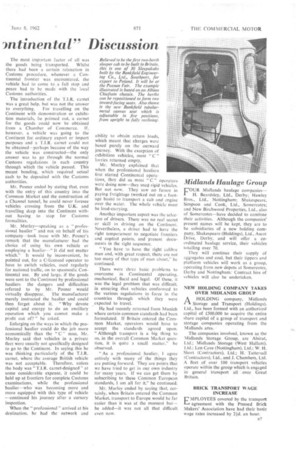The most important factor of all was the g oods bein g
Page 33

If you've noticed an error in this article please click here to report it so we can fix it.
transported. Whilst there had been a certain relaxation in Customs procedure, whenever a Continental frontier was encountered, the vehicle had to come to a full stop and peace had to be made with the local Customs authorities. The introduction of the T.I.R. carnet was a great help, but was not the answer to everything. For travelling on the Continent with demonstration or exhibition materials, he pointed out, a carnet for the goods could now be obtained from a Chamber of Commerce. If, however, a vehicle was going to the Continent for. ordinary export or import purposes and a T.I.R. carnet could not be obtained—perhaps because of the way the vehicle was constructed—the only answer was to go through the normal Customs regulations in each country through which the vehicle passed. This meant bonding, which required actual cash to be deposited with the Customs authorities. Mr. Posner ended by stating that, even with the entry of this country into the Common Market and the construction of a Channel tunnel, he could never foresee vehicles crossing from the U.K. and travelling deep into the Continent withbut having to stop for Customs formalities. . Mr. Murley—speaking as a " professional haulier" and not on behalf of his company—took issue with Mr. Posner's remark that the manufacturer had the choice of using his own vehicle or employing a haulier—" It did not matter which." It would tr inconvenient, he pointed out, for a C-licensed operator to have to switch vehicles, used regularly for national traffic, on to spasmodic Continental use. By and large, if the goods were sent to the Continent by professional hauliers the dangers and difficulties referred to by Mr. Posner would virtually disappear. The manufacturer merely instructed the haulier and could then forget about it. "Why devote capital and energy to do an ancillary operation which you cannot make a profit out of?" he asked. Enlarging on the ways in which the professional haulier could do the job more economically than the "C" man, Mr. Murley said that vehicles in a private fleet were usually not specifically designed to go to the Continent. In saying this he was thinking particularly of the T.I.R. carnet, where the average British vehicle was not acceptable. Therefore, unless the body was "hR. carnet-designed" at some considerable expense, it could be held up at frontiers for complete Customs examinations, while the professional haulier—who was becoming more and more equipped with this type of vehicle —continued his journey after a cursory inspection.
• When the "professional" arrived at his destination, he had the network and
ability to obtain return loads, which meant that charges were based purely on the outward journey. With the exception of exhibition vehicles, most "C " lorries returned empty. Mr. Murley explained that when the professional hauliers first started Continental operations, they did as most " C " operators were doing now—they used rigid vehicles. But not now. They saw no future in paying freightage (worked out on a footage basis) to transport a cab and engine over the water. The whole vehicle must be load-carrying. Another important aspect was the selection of drivers. There was no real secret or skill in driving on the Continent. Nevertheless, a driver had to have the right temperament to negotiate frontiers and coptrol points, and present documents in the right sequence. "You have to have the right calibre man and, with great respect, there are not too many of that type of man about," he continued.
There were three basic problems to overcome in Continental operating, mechanical, fiscal and legal. Of these, it was the legal problem that was difficult, in ensuring that vehicles conformed to the various regulations in force in the countries through which they were expected to travel. He had recently returned from Munich where certain common standards had been formulated. If Britain entered the Common Market, operators would have to accept the standards agreed upon. "Although transport is a big thing to us, in the overall Common Market question, it is quite a small matter," he observed.
" As a professional haulier, I agree entirely with many of the things they are putting forward. They, are points that we have tried to get in our own industry for many years. If we can get them by subscribing to these Common European standards, I am all for it," he continued. Mr. Morley 'ended by saying that, certainly, when Britain entered the Common Market, transport to Europe would be far easier than it was at the moment hut— he added—it was not all that difficult even now.




































































































